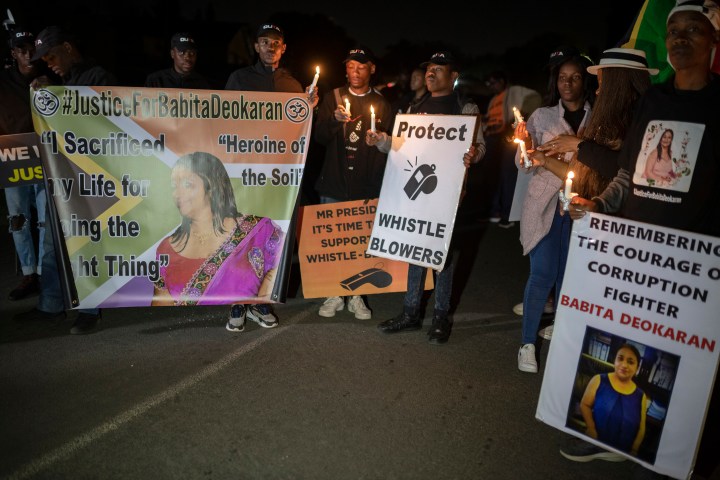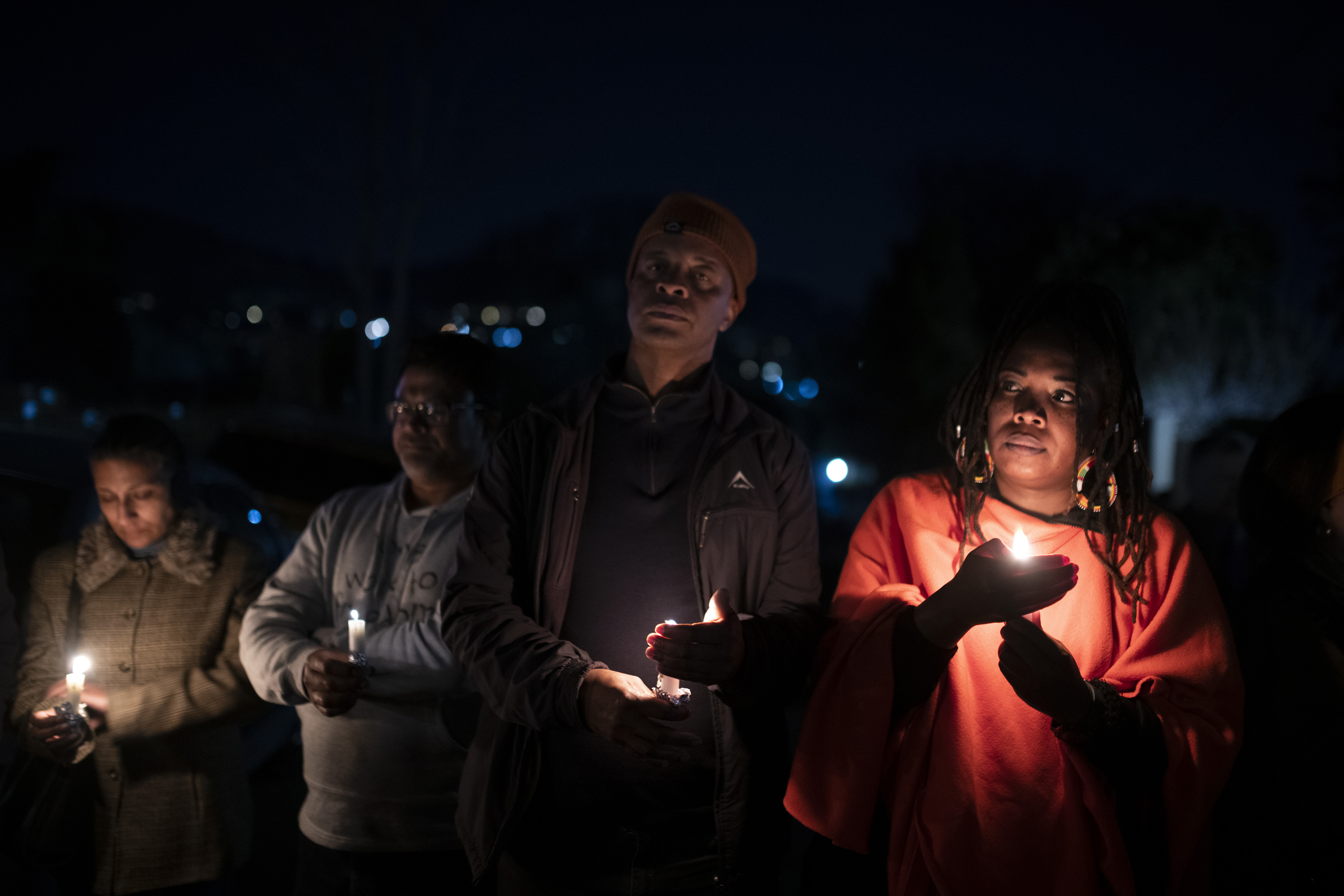CORRUPTION BUSTERS PART ONE
Plight of whistle-blowers — SA needs a culture shift and proper legislation

Whistle-blowers are currently ostracised — facing heavy social and economic costs for performing a courageous civic duty. This points to a failing system which urgently needs an overhaul. The question of how to protect and encourage whistle-blowers came under the spotlight at a recent conference in South Africa.
‘The life of a whistle-blower is a lonely one.” These were the words of a colleague of the late Babita Deokaran at a memorial service held on 23 August 2022, the first anniversary of her death.
Weeks after flagging fraudulent transactions worth hundreds of millions of rands, Deokaran, an employee of the Gauteng Health Department, paid the ultimate price. She died in a hail of bullets outside her home after dropping off her child at school.
Instead of being commended for their integrity and courage, whistle-blowers are often hounded out of their jobs by their superiors.
They face trumped-up disciplinary charges and are slapped with frivolous lawsuits which drain their financial resources and leave them in debt.
Their former colleagues shun them and they often find it hard to re-enter the labour market as prospective employers view them as troublesome.
Even if they manage to navigate the financial and psychological trauma that comes with blowing the whistle on corruption, the spectre of death remains an ever-present threat.
Corruption at Prasa
“I am just grateful to be alive,” said Martha Ngoye, the former head of the Passenger Rail Agency of South Africa’s (Prasa) legal division during her address at Deokaran’s memorial. Ngoye lifted the lid on corruption at Prasa. Her reward for fighting corruption was to be fired.

Martha Ngoye (right in red), the former head of Passenger Rail Agency of South Africa’s legal division, during a memorial for Babita Deokaran on the first anniversary of her death. (Photo: Ihsaan Haffejee)
“It’s been a struggle financially and emotionally. The whole process has been extremely traumatising,” said Ngoye, who feels as if the current system is hopelessly failing whistle-blowers.
“There is just no political will from the side of the government to do anything to protect whistle-blowers. We are on our own.”
Zondo Commission
Whistle-blowers played a fundamental role in exposing State Capture in testimony to the Zondo Commission. Their contributions helped to highlight corruption at multiple state-owned entities as well as the role played by private companies such as Bain and McKinsey.
Zondo himself acknowledged this multiple times in his report, calling whistle-blowers “one of the most effective weapons against corruption”, and that “a bona fide whistle-blower who reports wrongdoing should receive, as a matter of urgency, effective protection from retaliation”.
At present, being a whistle-blower in South Africa comes with huge consequences. This discourages others who might want to expose wrongdoing in their workplaces.
The Zondo Commission recommended that the government introduce legislation or amend existing legislation to ensure the protection and incentivisation of whistle-blowers. It also recommended the establishment of an anti-corruption agency to which whistle-blowers can make disclosures safely, with the agency also mandated to provide whistle-blowers with protection and support.
The protection of whistle-blowers
The question of how to effectively protect and encourage others to become whistle-blowers was discussed at a recent conference organised by the Public Affairs Research Institute (Pari) and the Council for the Advancement of the South African Constitution.
Prof Richard Calland, from the University of Cape Town, said our thinking on the subject should focus on what it would be like to be in the shoes of a person who is contemplating being a whistle-blower.
“We need to think about how best to organise the system of governance and law so that people are encouraged to safely step forward and share information,” said Calland.
Visit Daily Maverick’s home page for more news, analysis and investigations
According to Calland, one of the most critical issues facing potential whistle-blowers is the decision on to whom information of wrongdoing should be disclosed.
“Who the disclosure of information is made to is likely to be the most important decision a whistle-blower takes, with life-and-death consequences,” said Calland.
In his submission to the Zondo Commission, Calland advocated that we maximise the places where, and to whom, the whistle-blower can go to make the protected disclosure.
“In my opinion, there should be as much flexibility as possible, so that the putative whistle-blower can make a careful and informed choice as to where to take the information most safely, and with the greatest confidence that it will be respected, and that there will be no retaliation or betrayal of confidentiality.”
Financial incentives
In the first part of his report on State Capture, in a section titled, “The need to encourage whistle-blowers”, Judge Zondo asks, “Should whistle-blowers be incentivised to make disclosures?” He goes on to cite a proposal put forward by Pari, which published a position paper in April 2020 titled, “Reforming the Public Procurement System in South Africa”, and which proposed the introduction by legislation of qui tam provisions — an abbreviation of the Latin for, “he who sues on behalf of the King as well as for himself”.
“The essence of qui tam legislation is that it grants to some private persons the right to approach a court to enforce a public law. It simultaneously encourages such efforts with a reward — a financial incentive or bounty — for successful litigation.
“Incentivising civic efforts covers for gaps in political will and investigative capacity,” wrote the authors of the paper, Ryan Brunette and Jonathan Klaaren.
Essentially, a whistle-blower would be able to bring an action to court against the organisation or company that benefited from corruption and, if they were successful, would be rewarded with a portion of the forfeiture or damages awarded by the judge.
Judge Zondo, while noting the benefit of recouping damages suffered, recommends that “the responsibility to litigate on behalf of the State for the recovery of damages or the disgorgement of monies related to corruption in public procurement not be privatised”. He does, however, recommend that a fixed portion of the monies recovered be awarded to the whistle-blower.
“In the past I was always very much against the idea that there should be a reward for whistle-blowing. I was concerned that people would have the wrong motivation for coming forward. Twenty years later, I’ve revised my view on this. The circumstances now suggest that we need to shift our view [on incentivisation],” said Calland.
Review legislation
Whistle-blowers believe that the current legislation dealing with whistle-blowing — the Protected Disclosures Act — is insufficient.
The view that the act should be amended, or that entirely new legislation in relation to whistle-blowing should be passed, is widely accepted.
“But we also have to realise that the law is a very blunt instrument. We need a massive culture shift so that whistle-blowers are treated not as heroes or villains, but as ordinary citizens doing their civic duty on behalf of the whole of society,” said Calland.
The manner in which whistle-blowers are currently ostracised, facing heavy social and economic costs for performing a courageous civic duty, points to a failing system which needs overhauling as a matter of urgency.
Speaking at a recent summit in Johannesburg, Judge Zondo warned of the dangers of not adequately protecting whistle-blowers.
“The commission has heard a lot of evidence from whistle-blowers. If we do not look after these whistle-blowers during State Capture, they won’t be around next time. Others will look at how whistle-blowers were treated and will not come forward.
“A lot of people are reporting corruption. We must ensure that they are properly protected,” said Zondo. DM
Ihsaan Haffejee is a freelance writer commissioned by Pari to attend the State Capture Conference.





















 Become an Insider
Become an Insider
Comments - Please login in order to comment.